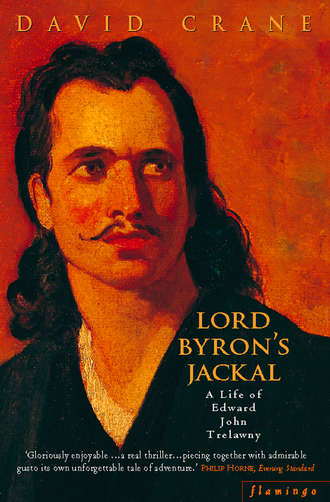
Полная версия
Lord Byron’s Jackal: A Life of Trelawny
Political realism has never been a feature of modern Greek history but, even by the extravagances of the last century and a half, Moldavia was a curious place to start a revolution. For almost four hundred years the Trans-Danubian provinces of Moldavia and Wallachia had suffered the heavy burden of Ottoman rule, and yet at the end of all that time, if there was a single sentiment beyond a hatred of the Turks that might have united its disparate peoples, it was a loathing of the Greek that ran almost as deep. For nearly four centuries Greeks had worked within the Ottoman Empire as assiduously as they had within its Roman predecessor, their women stocking its harems and their children its armies, their merchants, sailors, translators and administrators garnering to themselves those tasks and powers that seemed below Moslem dignity, and their great Constantinople families – the Greeks of the Phanar on the southern shore of the Golden Horn – sending out generation after generation to govern in the Danubian provinces with a greed that comfortably eclipsed that of their masters.*
It was one of the great tragedies of the War of Independence that the melancholy condition of Greece itself meant that its leadership inevitably fell to these Greeks of the Phanar and the scattered communities which made up the world of the Greek diaspora. Since the last, magical flowering of Byzantine culture at Mystra in the fifteenth century the geographical area of Modern Greece had declined into a state of impoverished misery, an almost forgotten backwater of Ottoman Europe, its traditions of freedom wilted to the bandit culture of the mountain klephts and all memory of its unique artistic and political inheritance buried under centuries of oppression.
It was from the West that this memory, so vital and so hazardous to the regeneration of the country, was re-imported into Greece, but it was crucially among the educated communities of the diaspora that the first Greek converts were made. Throughout the eighteenth century, these colonies had grown and prospered in capitals and ports from Marseilles to Calcutta, and as this new pride in their ancient past seeped into their consciousness, western Hellenism underwent a crucial seachange that took it out of the study and into the realm of political ambition.
The result was a volatile and dangerous new faith which owed as much to the trading and cultural links of these colonies with the Phanariot world of Constantinople as it did to the architectural purism of Stuart and Revett. In the journals and paintings of European travellers and scholars, eighteenth-century Philhellenism largely remained an innocuous and literary phenomenon, but as it made its way back to the Greek communities of the Black Sea and southern Russia it became a heady mix of Hellenistic posturing and Byzantine nostalgia, of alien political theory and grandiose ambition that looked to Constantinople – simply but eloquently the ‘polis’ – as the centre of a new-born Greece.
With the spread of the ideas and language of revolution after 1789 and the increased trade of the Napoleonic years, these aspirations gained a momentum that not even the Congress of Vienna could halt. By 1820, revolution to most Greeks within and without the Ottoman Empire seemed inevitable. For the previous five years a secret society called the Philike Hetairia had been at work, proselytizing and fund raising within the thriving Greek communities of Europe and Russia, and recruiting among the clergy and leaders of the Peloponnese and Northern Greece.
In 1820, a year of revolution across Europe, with rebellions in Portugal, Spain, Italy, and crucially, Ali Pasha’s in Albania, the moment seemed at hand. Through the winter the Apostles of the Philike Hetairia moved through the islands and mainland of Greece, spreading the word from initiate to initiate to prepare for war. Secrecy was virtually abandoned, so certain was everyone of the approaching rebellion, so rightly confident of Turkish indolence. In the Peloponnese, Germanos, the Bishop of Patras, and Petro Bey Mavromichaelis, head of the Maniots in the southern mountains of ancient Sparta, made ready. From the Ionian Isles, the great bandit leader, Theodore Colocotrones, slipped back from exile onto the mainland, drawn by the irresistible lure of patriotism and plunder; and in a town in southern Russia, the committee of merchants who were the sole reality behind the Philike Hetairia’s shadowy ‘Grand Arch’ appointed Alexander Ypsilanti to its supreme command.
Perhaps nothing so typifies the limitations of the Hetairists as that choice, because if Moldavia was an improbable place to begin a Greek revolution then Alexander Ypsilanti was an even more unlikely candidate for leader. A major general in the Russian army and the son of a Moldavian Greek hospadar or prince, Ypsilanti seems to have brought little to his task beyond the arrogance of the court and the morals of an autocracy, his single, dubious qualification for command being an arm lost in battle.
Within days of crossing the Pruth and beginning his leisurely march south, the ‘steward of the stewards of the August Arch,’ as he styled himself in a piece of characteristic masonic flummery, had succeeded only in alienating the Christian population he had come to redeem. By June the revolution in the Danubian provinces was over before it had ever really begun, disowned by the Tsar and riven by jealousies, a casualty of the indecision and moral cowardice of its leader and the sheer fatuity of Greek ambitions.
Ypsilanti’s campaign and his own subsequent flight into Austria rank among the most disgraceful episodes of the whole war, and yet while the insurrection had failed in the Danubian provinces, it had taken hold in Greece itself. It had seemed inconceivable to conspirators there that the Philike Hetairia could enter Moldavia without the tacit support of the Tsar, and as they took stock of an Ottoman Empire frustrated from within by the conservatism of its military and religious leadership, threatened on its borders by their Russian co-religionists, its authority in Africa no more than nominal and its forces engaged in a war against its most powerful vassal in Albania, the expectations raised by the Society generated their own self-fulfilling momentum.
‘Bliss was it in that dawn to be alive,’ Wordsworth had once believed of the French Revolution, and few of Europe’s Philhellenes who now saluted the Greek insurrection in the same vein can have had any idea of the forces they had unleashed. For centuries Greek and Turk had lived together in close proximity and when fighting burst out in 1821 it was not between army and army, but between community and community, atrocity met by atrocity and massacre by massacre in a frenzy of racial and religious hatred that convulsed the whole of the Greek world.
Within months of Germanos declaring a Holy War at Ayia Lavra, twenty thousand Turks had disappeared in the Peloponnese, as Monemvassia, Navarino, Tripolis, and eventually Nauplia fell into Greek hands. On the island of Chios, eighteen thousand Greeks were slaughtered in a matter of days. At Athens, Constantinople, Nicosia, Smyrna, Saloniki, on Rhodes and Cos, Greek butchered Turk and Turk Greek until, finally, when ancient hatreds had been glutted, when there were no more Turks to burn, rape, baptize and slaughter in the Peloponnese, and no more Greeks to circumcise and kill on Chios; when two thousand women and children had been stripped and butchered in a pass outside Tripolis, and the eighty-year-old patriarch hanged outside his cathedral in Constantinople, the war settled down into a more conventional shape.*
There are few conflicts before this century which so insistently demand to be remembered in terms of human misery, but if it is these horrors of 1821 that have left their most vivid mark on the national psyches of Greece and Turkey, it was the events of the next year that determined whether revolt would ever blossom into a full-scale war for independence. During the first months of rebellion Ottoman armies had been too busy with Ali Pasha of Ionnanina to deal with a second uprising as well, but with Ali’s murder on 5 February 1822 Sultan Mahmoud II, a ruler of slow and inexorable purpose, was at last free to turn his full attention to Greece itself.
The Ottoman plan was simple, and was embarked on with a characteristic confidence that took no account of terrain, season or opposition. From his base at Larissa in northern Greece the overall commander in Roumeli, Khurshid Pasha, sent two armies southwards down the western and eastern sides of the country, the first towards Misssolonghi and the other under the command of Dramali Pasha across the Isthmus of Corinth and into the Peloponnese and the heartland of the revolt.
With 23,000 men and 60,000 horses, Dramali’s army was the greatest to enter Greece in over a hundred years. Sweeping virtually unchallenged across the isthmus in July 1822, the Turks pushed down as far as Argos only to be reduced within a month by disease, privation, incompetence and unripened fruit to a dangerous and humiliating retreat through the unsecured mountain passes south of Corinth.
This retreat of Dramali’s weakened army gave the Greeks their greatest opportunity of the war in a terrain for which history, temperament and necessity had left them supremely well equipped. To the disgust of every foreigner reared on western tactics, their irregulars could never be made to stand up to Turkish cavalry in open conflict, but here among the crags and narrow mountain paths of Dervenakia it was another story, with those guerrilla skills honed by generations of brigand klephts coming spectacularly into their own.
With the Ottoman army trapped ‘like a herd of bisons’3 in the narrow passes, flight or defiance equally useless, Dervenakia was less a battle than a massacre. If the Greeks had not been more interested in plunder than killing, the slaughter would have been still worse, but even so five thousand Turks were killed and the army which had been sent to bring back ‘the ashes of the Peloponnese’ effectively destroyed. Ravaged by disease and hunger the remnant began their retreat along the southern coast of the Gulf of Corinth towards Patras, reduced first to horseflesh and then cannibalism, fighting among themselves over the graves of their comrades, burying their dead in the mornings only to dig them up again at night in a gruesome bid to ward off starvation.
Dervenakia gave the Greek army its most decisive victory of the whole war but just as important in its way was the campaign fought at the same time in western Greece. The army that had slaughtered the Turks in the passes of the north-east Peloponnese had fought under the most experienced of brigand chiefs in Theodore Colocotrones, but the force raised to face the Ottoman threat to Missolonghi was entrusted to the leadership of a newly arrived Phanariot aristocrat, Alexander Mavrocordato, a man for all his other talents without any experience of warfare and little enough of Greece itself.
The details of the campaign which followed belong properly to the military history of the rebellion, but the political and psychological impact of Mavrocordato’s failure are too important to ignore. The first task of this force was to relieve the Christian Suliote tribes of Epirus on the Turkish army’s right flank, and with this in mind Mavrocordato marched north from Missolonghi towards Arta with an army of a little over two thousand men, including in its ranks about one hundred Philhellene volunteers who had come out in the first months of the uprising.
The absurd vanity of many of these Philhellenes and the ingratitude of the Greeks they had come to save had already strained relations in Mavrocordato’s camp, and the first pitched battle they fought together confirmed the prejudices of both sides. Establishing his own headquarters at Langada on the eastern shore of the Ambracian Gulf, Mavrocordato pushed his army forward under the command of General Normann, his Chief of Staff. Advancing as far as Peta, a small village in the low hills to the east of the Turkish held town of Arta, Normann’s army prepared to face the enemy in a battle which could lose them everything and win them very little. In the van were their regular troops, comprising the Philhellene corps, and two battalions of Ionian volunteers and Greek soldiers. Behind them, holding the high ground and guarding their right flank, was a force of Greek irregulars led by an old and cynical bandit chief of dubious loyalty, Gogos.
Against the vastly superior force of infantry and cavalry that issued from Arta, the regulars held firm, their discipline and firepower repulsing the first Turkish assault without casualties. For the next two hours the battle seemed still to go their way, but while the Turkish commander, Reshid Pasha, kept up a desultory frontal attack on this force, a large contingent of his Albanian soldiers was marching in a flanking movement to the north in a bid to turn the Greek position.
With a strong body of Greek irregulars commanding the high ground, this should have been impossible, and the first that the Philhellenes knew of their fate was when they saw the Ottoman standard planted on the highest hill behind them. Gogos, in league with the enemy, had fled. The regulars were now hopelessly surrounded. Leading the cavalry himself, Reshid stormed their position, capturing their two pieces of artillery. Only twenty-five of the volunteers managed to force a way at bayonet point through the Turkish fines. The rest, fighting heroically to the end, redeemed every Philhellene folly by their courage, dying where they stood, or more horribly, on the walls of Arta.
The failure of Reshid to follow up his victory by taking Missolonghi limited the short-term significance of this campaign, but the strategic consequences of Peta reverberated dangerously on through the rest of the war. From the first tactless intrusion of Philhellene volunteers there had been an innate prejudice among Greeks against western methods of warfare, and with the contrasting evidence of Peta and Dervenakia at their disposal that breezy sense of superiority which is never far below the surface of the Greek national character hardened into an arrogance that would have fatal consequences.
For the time being, however, the rebellion was safe. With the defeat of Dramali’s army in the east and the withdrawal of Reshid in the west, Turkish initiative and energy were exhausted. Their troops still held on to Patras at the western end of the Gulf and to Modon and Coron – the old ‘Eyes of Venice’ – in the south-west. Up in the north, Greek resistance, isolated and exposed, had all but collapsed. In Attica, though, the former pupil of Ali Pasha, Odysseus Androutses, held Athens. In western Greece the heroism of Missolonghi had saved the town for even greater fame. At sea Ottoman and Greek fleets seemed as bent on avoiding each other as anything else. And in the Peloponnese – or the Morea as it was more usually known – the original heartland of the revolution, the Greeks did what Greeks have always done best when freed of external threat, and turned on one other.
Even through the dangers and triumphs of 1821–2, the divisions among the Greek leaders were never far below the surface, and by the middle of 1823 the country was sliding inexorably towards civil war. To the enthusiastic Philhellenes of Europe and America, it might seem that Greece had found itself the heirs to Demosthenes and Epaminondas, and yet even after a National Constitution and Government were established at Epidaurus on 13 January, with an executive and legislature and all the trappings of modern statehood, real power remained in the hands of local factions bent on turning the rebellion to their own narrow profit.
The politics of revolutionary Greece were so riddled by family and regional loyalties and feuds that no coherent picture is possible, but there were four main factions that dominated this struggle for power: the military capitani who won the first battles of the conflict; the great island families, grown powerful on the rich pickings of the Napoleonic War, who controlled the Greek fleets; the landlords or ‘primates’ of the Morea who had exercised such influence under the Turks; and the educated Phanariots and Greeks of the diaspora who had flooded in at the beginning of the revolution.
The social and economic realities which lay behind these divisions were real enough to hold serious consequences for the future of Greece, but to most foreigners and natives allegiances were more a matter of personalities than politics. In Athens, Odysseus Androutses governed eastern Greece with an Ali Pasha-like selfishness which made him a law to himself, but in western Greece and the Morea all those antagonisms that the successes of 1822 had exposed, the divisions between civilian and military, between constitutionalist and brigand, between Phanariot and native Greek, embodied themselves most vividly in the destructive rivalry of the two men who had presided over disaster and triumph at Peta and Dervenakia, Alexander Mavrocordato and Theodore Colocotrones.
It would be difficult to imagine two leaders more opposed in their backgrounds, aspirations or personalities. A descendant of the great Phanariot families that had governed in the Danubian provinces through the eighteenth century, ‘Prince’ Alexander Mavrocordato as he was styled, was living in impoverished exile in Italy – and teaching Mary Shelley Greek – when the rebellion broke out in the spring of 1821.
Among the first volunteers to sail from Marseilles to join the cause, Mavrocordato was perhaps its only leader who not only spoke but understood the languages and the ‘language’ of European diplomacy and Philhellenism. Among the native commanders of the rebellion Colocotrones or Petro Bey might invoke the shade of Epominandas or the principles of the nation state when it suited their purposes, but their Hellenism and liberalism were the thinnest of veneers on a narrow feudalism which had nothing in common with the modern and centralized Greece of which Mavrocordato dreamed at Epidaurus.
It is perhaps perverse to dismiss the career of the first President of Modern Greece as a failure, but because of this fundamental difference of vision Mavrocordato was never as successful a leader as his talents and meteoric rise had seemed to promise. At the first congress of 1821 he had been elected to the Presidency of the Assembly and then the country, and yet even in this moment of triumph, the determination of the old primates and captains to hold on to power guaranteed that while the Constitution might be written in his image Greece would still be run in theirs.
With the military failure of Mavrocordato at Peta any last hope of a stable and powerful central government was dealt a fatal blow, but the fact is that with his western frock coat, spectacles and principles he was always going to be at a disadvantage in a country locked in a ruthless and savage war. To the Greeks who had fought at Tripolis and Dervenakia there was inevitably something alien in his western skills, and it is a sobering feet about the way Greece still sees its revolution that while there is only one statue in the whole country to the most civilized of its leaders, it is difficult to find anywhere – from Tripolis to the old Parliament building in Athens – where the hawk-like features of Theodore Colocotrones do not glower down from under a ‘classical’ helmet on a nation only too happy to sacrifice political integrity to glamour.*
Avaricious and violent, corrupt, bold, cynical and charismatic, the fifty-year-old Colocotrones was everything as a military leader that the cosmopolitan and haplessly civilian Mavrocordato could never be. ‘It would be impossible for a painter or novelist to trace a more romantic delineation of a robber chieftain,’ the Philhellene soldier and great historian of the war, Thomas Gordon, wrote of Colocotrones,
tall and athletic, with a profusion of black hair and expressive features, alternately lighted up with boisterous gaiety, or darkened by bursts of passion: among his soldiers, he seemed born to command, having just the manners and bearing calculated to gain their confidence.4
Along with this air of authority, with the physical strength and presence so essential to any klepht leader, went a history to match. Born under a tree in the hills of Messenia on the Easter Monday of 1771, Colocotrones came from a long line of Turk-haters who had slid between policing the mountains as armatoles and living off them as bandits in the central Morea.
It was always his proud boast that in four hundred years of occupation his family had never once succumbed to Ottoman rule, and at the age of only fifteen Colocotrones himself fell naturally into the brigand life which had already killed his father and thirty-three of his nearest kin.
After twenty years of indiscriminate banditry against Greek and Turk alike, he was forced into exile in the Ionian Isles, but when the revolution broke out in 1821 he was ready again to resume his old life with a new and expanded brief. Present at the fell of Kalamata in the first days of the uprising, his influence and guerrilla talents soon gained him command of the troops besieging Tripolis, and victory there and at Dervenakia the following year gave him the plunder and prestige to make him the most powerful man in the Morea.
It was a position he exploited entirely for his own ends. He was not interested in the fate or even the idea of a Greece beyond the Peloponnese. To Colocotrones the war was about wealth and power, not about nationhood or any of the other battle cries of Philhellenism. In April 1823 he used the threat of his soldiers to have himself and Petro Bey elected to the Presidency and Vice Presidency, but it was a gesture of contempt for the position Mavrocordato had once held and not an endorsement of the political process. His authority, like his vision, was that of a chieftain, and by the middle of the year the rump of the government that he had usurped had fled from his vengeance to the safety and irrelevance of the islands.
It was this political situation, with the two-year-old nation only weeks from civil war, with feudal warlords in control of their private fiefdoms in the Morea and eastern Greece, with western Greece in chaos, the government in exile and Mavrocordato fled for his life to the island of Hydra, which greeted Byron when he landed at Argostoli.
From on board the Hercules he had pointed out the distant coastline of the Morea with all the excitement of a man reliving his youth, but it was not long before the reality that lay behind the shimmering image was brought rudely home. ‘The instinct that enables the vulture to detect carrion from far off,’ Trelawny wrote of their arrival, ‘is surpassed by the marvellous acuteness of the Greeks in scenting money.
The morning after our arrival a flock of Zuliote refugees alighted on our decks, attracted by Byron’s dollars. Lega, the steward, a thorough miser, coiled himself on the money-chest like a viper. Our sturdy skipper was for driving them overboard with hand-spikes. Byron came on deck in exuberant spirits, pleased with their savage aspect and wild attire, and, as was his wont, promised a great deal more than he should have done.5
In the months ahead Byron would have to pay for the caprice that made him take on these Suliots as a bodyguard, but it was the wider chaos of Greece that was soon engrossing his attention. From the moment that he went ashore at Argostoli on 3 September 1823, the struggle among the Greek factions for his money and support began. ‘No stranger,’ the young Philhellene George Finlay,* who was on Cephalonia at this time, recalled, ‘estimated the character of the Greeks more correctly than Lord Byron …’
It may, however, be observed that to nobody did the Greeks ever unmask their selfishness and self-deceit so candidly. Almost every distinguished statesman and general sent him letters soliciting his favour, his influence, or his money. Colocotrones invited him to a national assembly at Salamis. Mavrocordato informed him that he would be of no use anywhere but at Hydra, for Mavrocordato was then in that island. Constantine Metaxa who was governor of Mesolonghi, wrote, saying that Greece would be ruined unless Lord Byron visited that fortress. Petrobey used plainer words. He informed Lord Byron that the true way to save Greece was to lend him, the bey, a thousand pounds. With that sum not three hundred but three thousand Spartans would be put in motion to the frontier, and the fall of the Ottoman empire would be certain.6







